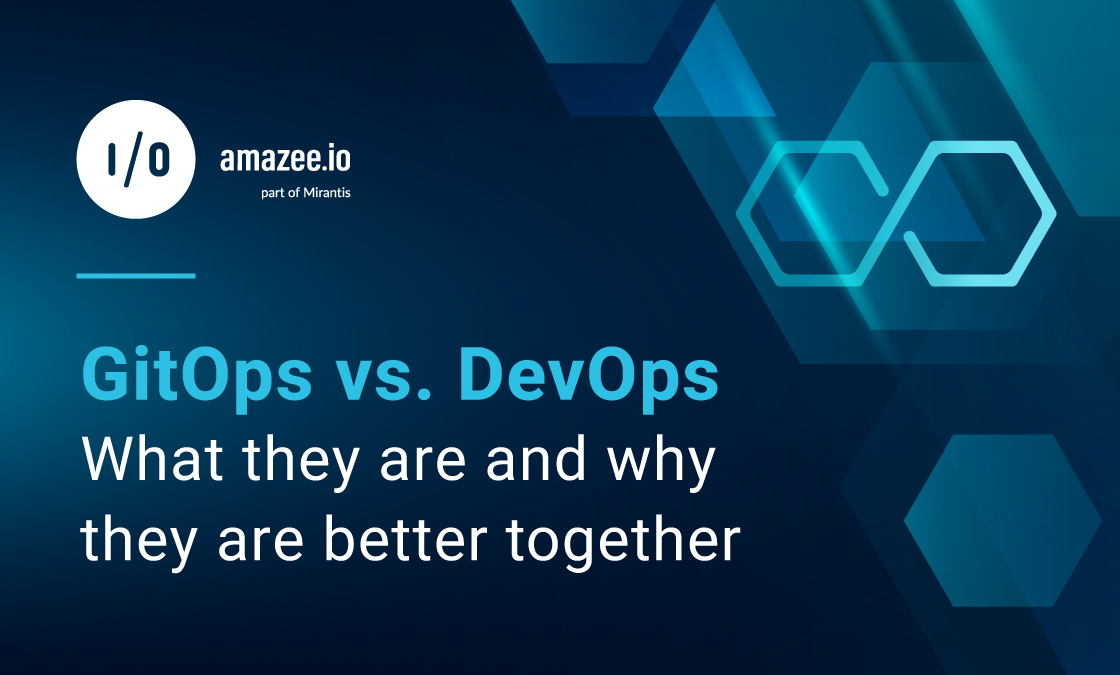Bryan Gruneberg
|
Nov 21, 2023
|7 min read
Search Topic

In modern software development, two terms often pop up: GitOps vs. DevOps. While they share similarities, they are different concepts. In this blog post, we will define both concepts, explore their differences, highlight their similarities, and discuss how they complement each other. Additionally, we will touch on how open source tools like Lagoon leverage GitOps practices.
GitOps is a methodology that emphasizes managing infrastructure and applications declaratively as code, using a Git repository as the source of truth for application code, deployments, and infrastructure operations. It extends the principles of Infrastructure as Code (IaC) to application deployments, making it possible to manage your entire tech stack through version-controlled code repositories.
Critical characteristics of GitOps include:
DevOps is a team cultural and operational practice whose adoption is aimed at breaking down the traditional silos that have existed between development and operations (including deployment, infrastructure, security, etc) teams. DevOps encourages collaboration, communication, and automation throughout the software development lifecycle. DevOps principles include:
Here are the main top-level differences between GitOps and DevOps:
| Feature | GitOps | DevOps |
|---|---|---|
| Concept | A practical methodology and software development approach that uses Git as the single source of truth for application code, infrastructure, and application deployment. | A software development methodology and team approach that emphasizes the breaking down of silos through collaboration and communication between development and operations teams. |
| Workflow | Automates the workflow from code to production using Git as the central hub for all changes. | Involves team culture, practical processes, and automation tools for code integration, testing, and deployment. |
| Deployment | Deployments are fully automated and triggered by changes in the Git repository. | Deployments are done either manually or by leveraging various degrees of automation. |
| Rollback | Rollbacks are fully automated and can be easily done by reverting to a previous Git commit. Developers AND operators get more time back. | Rollbacks are typically done manually and may require additional testing. |
| Auditing and Tracking | Git's built-in tracking and auditing capabilities make it easy to track and revert changes. | Auditing and tracking of changes relies on the team dynamic and the practices. DevOps teams can embrace GitOps to accomplish this. |
| Collaboration | GitOps' use of Git as the single source of truth facilitates collaboration and communication. This makes life easier for developers and operators since everything is centered around a single source of truth. | DevOps is all about breaking down silos. Thus, DevOps teams are, by nature, highly dependent on collaboration. Embracing approaches like GitOps increases this collaboration and smooths engagement. |
| Business Benefits | Provides consistency, reliability, and scalability while enabling faster time-to-market and easier rollbacks. | Is known to lead to faster time-to-market, but without transparent systems and processes, it can start to lack consistency and reliability over time. |
However, GitOps vs. DevOps also differ in their approaches and focus areas:
By showcasing the differences between the two concepts of GitOps and DevOps, we aim to show not only where they differ but also where, when the two concepts are used jointly, they can complement and support each other and make life as a dev so much smoother and more worry-free. In our opinion, with GitOps vs. DevOps, it’s never an either-or but a both-and!
Despite their differences, GitOps and DevOps share several common elements:
GitOps vs. DevOps are not mutually exclusive; they can be highly complementary. Here's how they can work together:
GitOps helps you maintain visibility and historical traceability, from beginning to end, with every aspect of development, Including from writing code to building, testing, and deployment. This means that developers have visibility into the DevOps activities.
GitOps embodies the spirit of DevOps in a developer-focused way, with a strong emphasis on code (literally everything is code.) GitOps helps unify all DevOps elements around a single source of truth, or a single Git repository, for anyone involved.
The most crucial benefit of adopting GitOps is that it can help developers do everything at their own pace without being bottlenecked by other teams or operations. Making changes through Git and having automation make the deployments means developers can do what they need to: Code without waiting for resources to be assigned or approved by other teams.
For operations teams, complete visibility means they can improve security because there’s a trackable record of everything they can follow. Overall, the benefits of your DevOps team using GitOPs are making your organization move faster, making the right changes, and speeding up timelines in an increasingly competitive business landscape.
Lagoon, a modern hosting platform, is a valuable tool supporting GitOps practices. Lagoon allows you to manage your application environments, containers, and infrastructure using Git repositories as the source of truth. It integrates seamlessly with CI/CD pipelines, making implementing GitOps for application deployments easier.
GitOps is a powerful way that developers can better manage software. With amazee.io’s Lagoon, your developers will have easy and instant access to following a GitOps approach as they deploy apps and sites via Git into Lagoon. Lagoon supports developers developing and deploying through Git, which can help teams work collaboratively and get more done.
GitOps and DevOps are both essential practices in the realm of modern software development, each with its unique strengths and focus areas. While they have their differences, they work best hand in hand to create a powerful and efficient software delivery pipeline. When properly integrated, GitOps and DevOps practices can help development and operations teams collaborate effectively, automate processes, and ensure consistent and reliable software delivery. Tools like Lagoon can further enhance the implementation of GitOps principles, simplifying the management of applications and infrastructure.
If you want to learn more about our ZeroOps, fully open source application delivery and hosting platform, schedule a meeting with us today. We’d love to chat.

